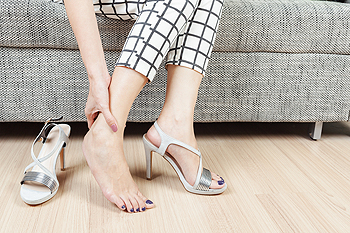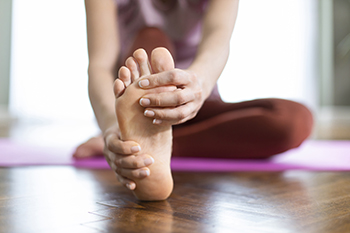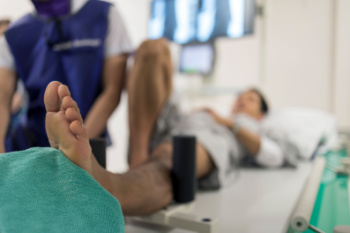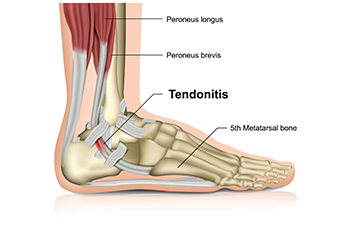Items filtered by date: September 2025
High Heels and Insoles
 When specific types of high heels are worn, they may give the legs and feet the illusion of looking leaner and elegant, despite the possible foot problems that may develop. These problems can include the formation of bunions, hammertoe, and ingrown toenails. It is important that high heels fit properly, and the shoe size may need to increase if weight is gained. Research has indicated that feet may feel more comfortable when high heels are made with thicker heels. This is helpful in providing the balance that is needed to perform daily activities, in addition to providing a more even distribution of body weight. Many patients choose to wear insoles, which may prevent foot pain. If more information is needed about the types of high heels to purchase, it is strongly suggested that you speak to a podiatrist, who can address any concerns you may have.
When specific types of high heels are worn, they may give the legs and feet the illusion of looking leaner and elegant, despite the possible foot problems that may develop. These problems can include the formation of bunions, hammertoe, and ingrown toenails. It is important that high heels fit properly, and the shoe size may need to increase if weight is gained. Research has indicated that feet may feel more comfortable when high heels are made with thicker heels. This is helpful in providing the balance that is needed to perform daily activities, in addition to providing a more even distribution of body weight. Many patients choose to wear insoles, which may prevent foot pain. If more information is needed about the types of high heels to purchase, it is strongly suggested that you speak to a podiatrist, who can address any concerns you may have.
High heels have a history of causing foot and ankle problems. If you have any concerns about your feet or ankles, contact Adam Klein, DPM from Lynbrook, NY. Our practitioner can provide the care you need to keep you pain-free and on your feet.
Effects of High Heels on the Feet
High heels are popular shoes among women because of their many styles and societal appeal. Despite this, high heels can still cause many health problems if worn too frequently.
Which Parts of My Body Will Be Affected by High Heels?
- Ankle Joints
- Achilles Tendon – May shorten and stiffen with prolonged wear
- Balls of the Feet
- Knees – Heels cause the knees to bend constantly, creating stress on them
- Back – They decrease the spine’s ability to absorb shock, which may lead to back pain. The vertebrae of the lower back may compress.
What Kinds of Foot Problems Can Develop from Wearing High Heels?
- Corns
- Calluses
- Hammertoe
- Bunions
- Morton’s Neuroma
- Plantar Fasciitis
How Can I Still Wear High Heels and Maintain Foot Health?
If you want to wear high heeled shoes, make sure that you are not wearing them every day, as this will help prevent long term physical problems. Try wearing thicker heels as opposed to stilettos to distribute weight more evenly across the feet. Always make sure you are wearing the proper shoes for the right occasion, such as sneakers for exercising. If you walk to work, try carrying your heels with you and changing into them once you arrive at work. Adding inserts to your heels can help cushion your feet and absorb shock. Full foot inserts or metatarsal pads are available.
If you have any questions, please feel free to contact our office located in Contact Us . We offer the newest diagnostic and treatment technologies for all your foot care needs.
The Causes of Ticklish Feet

Ticklish feet are a common sensation that can make some people laugh uncontrollably, while others may find it uncomfortable. The sensitivity in the feet is due to the presence of approximately 8,000 nerve endings that respond to various stimuli. The sensation of tickling can be broken down into two types, which are known as knismesis and gargalesis. Knismesis refers to a light, often gentle touch that can cause itching or mild tickling sensations, while gargalesis is a more intense form of tickling that often results in laughter and can trigger an involuntary response. People vary in their sensitivity to tickling, as factors such as genetic makeup, nervous system sensitivity, and psychological aspects play a role. The feet are particularly sensitive due to their high concentration of nerve endings, which makes them more susceptible to ticklish sensations when touched or stimulated. Ticklish feet can be bothersome while having pedicures performed or getting foot massages. It may also indicate diabetes. If you have particularly sensitive feet, it is suggested that you consult a podiatrist who can educate you on this condition.
Foot Pain
Foot pain can be extremely painful and debilitating. If you have a foot pain, consult with Adam Klein, DPM from Lynbrook, NY. Our practitioner will assess your condition and provide you with quality foot and ankle treatment.
Causes
Foot pain is a very broad condition that could be caused by one or more ailments. The most common include:
- Bunions
- Hammertoes
- Plantar Fasciitis
- Bone Spurs
- Corns
- Tarsal Tunnel Syndrome
- Ingrown Toenails
- Arthritis (such as Gout, Rheumatoid, and Osteoarthritis)
- Flat Feet
- Injury (from stress fractures, broken toe, foot, ankle, Achilles tendon ruptures, and sprains)
- And more
Diagnosis
To figure out the cause of foot pain, podiatrists utilize several different methods. This can range from simple visual inspections and sensation tests to X-rays and MRI scans. Prior medical history, family medical history, and any recent physical traumatic events will all be taken into consideration for a proper diagnosis.
Treatment
Treatment depends upon the cause of the foot pain. Whether it is resting, staying off the foot, or having surgery; podiatrists have a number of treatment options available for foot pain.
If you have any questions, please feel free to contact our office located in Contact Us . We offer the newest diagnostic and treatment technologies for all your foot care needs.
How to Tell if You Have a Foot Stress Fracture

Stress fractures of the foot are tiny cracks in the bone caused by repeated pounding rather than a single injury. Stress fractures most often occur in the metatarsal bones of the midfoot. They may develop gradually in people who run long distances, suddenly increase training intensity, or spend extended hours on their feet. Risk factors can include a high arch, thinning bones, or footwear that lacks adequate support. A common sign of a foot stress fracture is pain that begins during activity and improves with rest, but returns more quickly with each new workout. Swelling, tenderness when pressing on the affected area, and difficulty walking can also occur. A podiatrist can evaluate foot stress fractures with imaging studies, provide guidance on reducing weight-bearing, and recommend immobilization or surgery, in severe cases. If you experience pain in your feet after exercise, it is suggested that you schedule an appointment with a podiatrist for an evaluation and appropriate treatment.
Activities where too much pressure is put on the feet can cause stress fractures. To learn more, contact Adam Klein, DPM from Lynbrook, NY. Our practitioner can provide the care you need to keep your pain free and on your feet.
Dealing with Stress Fractures of the Foot and Ankle
Stress fractures occur in the foot and ankle when muscles in these areas weaken from too much or too little use. The feet and ankles then lose support when walking or running from the impact of the ground. Since there is no protection, the bones receive the full impact of each step. Stress on the feet can cause cracks to form in the bones, thus creating stress fractures.
What Are Stress Fractures?
Stress fractures occur frequently in individuals whose daily activities cause great impact on the feet and ankles. Stress factors are most common among:
- Runners
- People affected with Osteoporosis
- Tennis or basketball players
- Gymnasts
- High impact workouts
Symptoms
Pain from the fractures occur in the area of the fractures and can be constant or intermittent. It will often cause sharp or dull pain with swelling and tenderness. Engaging in any kind of activity which involves high impact will aggravate pain.
If you have any questions please contact our office located in Contact Us . We offer the newest diagnostic and treatment technologies for all your foot and ankle needs.
Inspect Your Feet Regularly for Abnormalities if You're Diabetic
Non-Injury Causes of Toe Pain

Toe pain does not always come from an injury and can often result from underlying conditions that affect the feet. Skin problems are a common source of toe pain. Corns, calluses, blisters, warts, athlete’s foot, and ingrown toenails may cause discomfort, redness, or swelling. Infections can also lead to painful changes in the toenails or surrounding skin. Joint issues, such as bunions, bunionettes, hammer toes, arthritis, or gout, can make walking difficult and alter toe alignment. Pain may also develop in the ball of the foot from metatarsalgia. Nerve problems such as Morton’s neuroma, tarsal tunnel syndrome, or neuropathy can produce tingling, burning, or numbness in the toes. Additionally, circulatory changes, often seen in people with diabetes, can further contribute to nerve damage and pain. A podiatrist can diagnose the source of your toe pain and provide effective treatment, depending on the condition. If you are experiencing toe pain, it is suggested that you schedule an appointment with a podiatrist for appropriate treatment.
Toe pain can disrupt your daily activities. If you have any concerns, contact Adam Klein, DPM of Lynbrook, NY. Our practitioner can provide the care you need to keep you pain-free and on your feet.
What Causes Toe Pain?
Most severe toe pain is caused due to a sports injury, trauma from dropping something heavy on the toe, or bumping into something rigid. Other problems can develop over time for various reasons.
Toe pain can be caused by one or more ailments. The most common include:
- Trauma
- Sports injury
- Wearing shoes that are too tight
- Arthritis
- Gout
- Corns and calluses
- Hammertoe
- Bunions
- Blisters
- Ingrown toenails
- Sprains
- Fractures (broken bones)
- Dislocations
When to See a Podiatrist
- Severe pain
- Persistent pain that lasts more than a week
- Signs of infection
- Continued swelling
- Pain that prevents walking
Diagnosis
In many cases the cause of toe pain is obvious, but in others, a podiatrist may want to use more advanced methods to determine the problem. These can range from simple visual inspections and sensation tests to X-rays and MRI scans. Prior medical history, family medical history, and any recent physical traumatic events will all be taken into consideration for a proper diagnosis.
Treatment
Treatments for toe pain and injuries vary and may include shoe inserts, padding, taping, medicines, injections, and in some cases, surgery. If you believe that you have broken a toe, please see a podiatrist as soon as possible.
If you have any questions please contact our office located in Contact Us . We offer the newest diagnostic and treatment technologies for all your foot and ankle needs.
Common Achilles Tendon Injuries and How to Find Relief

The Achilles tendon is the strongest tendon in the body, connecting the calf muscles to the heel bone, yet it is prone to painful injuries. Achilles tendinopathy is a condition marked by stiffness, swelling, and discomfort along the tendon, often caused by overuse or repetitive stress. A sudden rupture, or break, occurs when the tendon tears, usually with sharp pain and difficulty walking or pushing off the foot. These injuries typically occur in the back of the ankle, just above the heel. A podiatrist can provide a thorough evaluation, advanced treatments, and guidance for safe recovery. If you are experiencing Achilles tendon pain or have sustained an injury, it is suggested that you consult this type of doctor who can accurately diagnose and effectively treat this condition.
Achilles tendon injuries need immediate attention to avoid future complications. If you have any concerns, contact Adam Klein, DPM of Lynbrook, NY. Our practitioner can provide the care you need to keep you pain-free and on your feet.
What Is the Achilles Tendon?
The Achilles tendon is a tendon that connects the lower leg muscles and calf to the heel of the foot. It is the strongest tendon in the human body and is essential for making movement possible. Because this tendon is such an integral part of the body, any injuries to it can create immense difficulties and should immediately be presented to a doctor.
What Are the Symptoms of an Achilles Tendon Injury?
There are various types of injuries that can affect the Achilles tendon. The two most common injuries are Achilles tendinitis and ruptures of the tendon.
Achilles Tendinitis Symptoms
- Inflammation
- Dull to severe pain
- Increased blood flow to the tendon
- Thickening of the tendon
Rupture Symptoms
- Extreme pain and swelling in the foot
- Total immobility
Treatment and Prevention
Achilles tendon injuries are diagnosed by a thorough physical evaluation, which can include an MRI. Treatment involves rest, physical therapy, and in some cases, surgery. However, various preventative measures can be taken to avoid these injuries, such as:
- Thorough stretching of the tendon before and after exercise
- Strengthening exercises like calf raises, squats, leg curls, leg extensions, leg raises, lunges, and leg presses
If you have any questions please feel free to contact our office located in Contact Us . We offer the newest diagnostic tools and technology to treat your foot and ankle needs.

